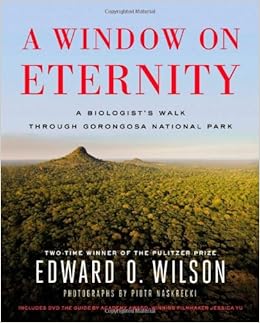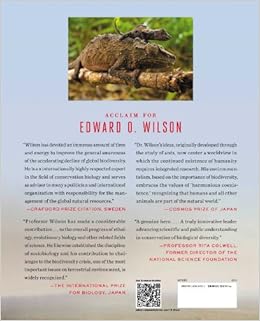*Starred Review* A man of towering achievements, biologist and Pulitzer Prize winner Wilson (Letters to a Young Scientist, 2013) is still happiest in the field, alert to new discoveries. In his latest book, this inspiring teacher and clarion voice of reason and wonder, compassion and realism turns his exploration of Mozambique’s Gorongosa National Park in search of “previously little-known insect fauna” into a walking seminar on the grand and complex web of life and how human activity imperils it. Damaged by a brutal civil war, poverty, deforestation, and poaching, Gorongosa, a place of caves, ravines, rain forests, and mountains, is now being restored, thanks to the government’s innovative partnership with American philanthropist Gregory Carr. Fascinated by the region’s natural and human history, Wilson conducts Gorongosa’s first “bioblitz,” in which local children and adults count wildlife species, and revels in his own encounters. He explains why “Africa needs its elephants” and celebrates all the “little things that run the world,” including his specialty, ants, and mound-building termites. Profoundly knowledgeable and passionately appreciative of the beauty and ferocity of life and its finely calibrated and vulnerable equilibrium, Wilson calls for more “inviolate nature reserves” around the world because wildlands “maintain the stability” of the biosphere, and nature “is the birthright of everyone on Earth.” --Donna Seaman
Review
“
A Window on Eternity revels in biodiversity and nature’s inventiveness. . . . Wilson plants his defiant flag defending biodiversity in a place once so brutally despoiled that its recovery is truly momentous.” (Stuart Pimm
Nature)
“Wilson suggests that our tired planet, managed wisely, can still demonstrate an enormous capacity for regeneration. . . . [his] prose consistently strikes a note of transcendence, and one sees a hint of that, too, in the pictures of Gorongosa by Piotr Nasrecki that accompany the text.” (Danny Heitman
The Christian Science Monitor)
“The father of sociobiology and one of the most prolific science writers of our time, Edward O. Wilson is back with a new book that explores a slice of wilderness in deepest Africa. . . . As usual, Wilson’s observations carry more weight than the descriptions of a simple naturalist. In
A Window on Eternity, he invites us to glimpse ourselves in the mirror of one of Earth’s few remaining wildernesses.” (Bob Grant
The Scientist)
"[Wilson is] The world's greatest living naturalist." (Justin Moyer
The Washington Post)
“Wilson describes in language that is both poetic and scientific a kind of parable of what is possible in the realm of environmental protection. . . . By destroying the natural world, we are destroying ourselves. Our blindness to this reality is the most crucial and fundamental fact of the world today.
A Window on Eternity brings this reality into focus in a lucid and disarmingly gentle manner. It is a fitting capstone to Wilson's exceptional career.” (David Edmund Moody
The Huffington Post)
“A lyrical ode to biodiversity. . . . Wilson speaks with passion throughout. . . . This volume’s visual content [is] as remarkable as the stories.” (
Publishers Weekly (starred review))
“Entomologist E.O. Wilson chronicles both the shifting ecology of Gorongosa after the war and how researchers are trying to repair the damage. . . . Naskrecki’s images are a delight, capturing the spirit of the recovering landscape and its animals, great and small. . . . Ultimately, the book is a cautionary tale about how human affairs are fundamentally entangled with the natural world.” (Allison Bohac
Science News)
“Wilson specializes in ants, and his explanations about the importance of insect relationships and biodiversity in Gorongosa are charming and accessible—no jargon, just joy.” (
Associated Press)
“The famed biologist still gets giddy as a schoolboy when he encounters ants that can consume a live python, or describe how to hypnotize a dragonfly. Wilson waxes poetic about the marvel of the park's well-balanced ecosystems, but changes his tone in the final chapter: a condemnation of humanity trampling en route to what he calls the Eremocene, or Age of Loneliness.” (
Discover)
“The rebirth of a premier nature reserve in Mozambique, recounted in a gentle storytelling style by noted Harvard entomologist Wilson. . . . A big story about a small place with an ageless appreciation and discernment it would be criminal to ignore.” (
Kirkus Reviews)







